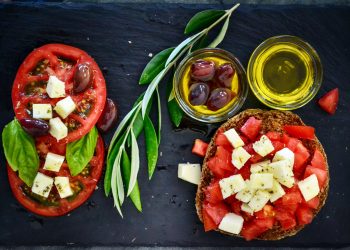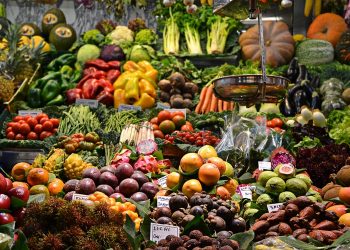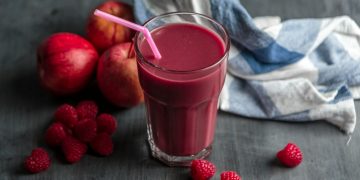Following healthy diets has never been easy but in time of with lockdown and pandemic, they could be your savior.
Everyone’s life has turned upside down ever since the Covid-19 pandemic struck the world.
One day you are planning a vacation and then all of a sudden stepping out of the house is a matter of life and death.
By staying at home our lives have spiraled downward. Lifestyles have become unhealthy. Panic buying and developing bad eating habits aren’t helping the situation.
It is noted that people following healthy eating habits are possibly safer from virus.
Along with social distancing and following SOPs it is also important to have a healthy diet.
Why Healthy Diets?
Healthy eating involves following a balanced diet and eating such foods that will keep you away from obesity and chronic diseases.
That means munching on broccoli or berries rather than a bag of chips and snickers.
During this pandemic, it is noted that people with certain health conditions are at more risk.
Keeping the disease away by healthy eating will boost your immunity. This immunity will make you feel safer than sorry.
The best diets were ranked by U.S. News and world report. These diets were ranked by experts based on their health potential.
Starting these diets rather than some fad diets might be a smarter move for you.
Mediterranean Diet

Originating from the Mediterranean Sea, this diet has been ranked the best diet for two years now.
This diet has been around for decades and is considered a lifestyle rather than a diet. People in the Mediterranean suffer from less chronic disease as compared to average Americans.
This possibly explains the recent surge in popularity of this diet.
Many studies have shown that this diet might improve heart health and diabetes. Additionally, it might aid in weight loss, brain health, and cancer prevention.
There is no strict diet plan but the general principle is the same.
- High level of fruits, vegetables, whole grain products, beans, legumes,, spices, herbs, seeds, and nut.
- Moderate level of poultry, fish, dairy, and eggs.
- Red meat only a few times a month
- Olive oil as a primary or only source of fat
- Intake of sugary foods only on special occasions.
Due to its simplicity and ease, the Mediterranean diet could be followed for the long term.
The only downside is that some Americans might have trouble adopting this dietary change.
Weight loss is slow but achievable with this diet and it is also found that this diet doesn’t increase weight significantly. Adding regular exercise and calorie deficit will boost these results.
Just remember to control the portion and reduce that yogurt, olive oil, and cheese intake if you are aiming for weight loss.
DASH diet

DASH is abbreviated for dietary approaches to stop hypertension.
The main goal is to control high blood pressure with a nutritious diet. Other than hypertension, it also plays a role in good heart health by lowering LDL (bad cholesterol) and controlling diabetes.
DASH diet closely resembles the Mediterranean diet with minor changes
- It emphasizes the use of veggies, fruits, whole grain, lean protein, and low-fat dairy.
- This diet discourages the use of high saturated fats like fatty meat, full-fat dairy, and tropical oils.
- High sugar foods and beverages are also restricted.
- Sodium intake is lowered to 1500 milligrams per day.
This diet is easy to follow long term diet but might be difficult in the beginning if you really love your salt.
It is recommended to gradually move toward this diet rather than going for a drastic change overnight.
Weight loss is possible from this diet since most of the sugary and fatty food is avoided.
The Flexitarian diet

Flexitarian is the combination of words flexible and vegetarian. This diet resembles a vegan diet but is not restricted to vegetables.
You can be a vegetarian and still enjoy meat on a few occasions.
There are basically five groups in this diet.
- New meat (non-meat protein like beans, peas or eggs)
- Fruits and Veggies
- Whole grains
- Dairy
- Sugar and Spices
Weight Loss, diabetes prevention or control, and heart safety are few of the perks of this diet. People who are gluten intolerant can follow this diet easily by slight modifications. Salt intake is also limited in this diet.
This diet can be followed for the long term without causing any serious harm.
Of course, there are few downsides too. You have to depend on supplements for some minor nutrients like iron and B-12.
If you hate fruits and vegetables then this diet could be a nightmare for you.
Mayo clinic diet

The main focus of this diet is to break bad eating habits and replace them with healthier ones.
Weight loss and healthy eating are the main goals.
In this diet, you eat low energy density food. Meaning that you can eat more and consume very few calories by moving to healthier choices.
The Mayo clinic diet pyramid focuses on whole grains, fruits, and vegetables. There are two phases in this diet: ‘Lose it’ and ‘Live it’.
In ‘Lose it’ phase you break bad habits like avoiding fatty snacks, sugary foods and eating while watching TV. Bad habits are replaced with good ones by adding whole grains, fruits, vegetables along with 30 minutes of exercise to lifestyle.
The second phase is ‘Live it’. In this phase, you follow what you learned in ‘Lose it' and can occasionally break the rules. This diet becomes your lifestyle in this phase.
Although it is a long term and easy diet, starting it takes some serious motivation.
If you are interested in following this diet be sure to check out Mayo Clinic’s official site to learn more.
MIND diet

The MIND diet takes the two popular diets- Mediterranean and DASH- and focuses on food that impacts brain health.
Eating the diet good for the brain might prevent mental decline.
A study suggests that this diet might lower the chances of Alzheimer's. People who moderately followed this diet lowered Alzheimer's risk by 35%. Those who strictly followed it lowered the risk by 53%.
MIND diet couldn’t be called a balanced diet since it is a low-carb diet. The study is limited but it is possible that it prevents certain chronic diseases like its parent diets.
There are ten main brain-healthy food groups that the MIND diet emphasizes. These are green leafy veggies, all other veggies, berries, nuts, beans, whole grain, wine, fish, poultry, and olive oil.
While red meat, butter/margarine, cheeses, pastries, sweets, and fried/ fast food should be avoided or limited.
The data on this diet's long term effect is insufficient, though it is easy to follow. It could play a good role in weight loss since it focuses on low carbs and vegetables.
Conclusion
- WHO focuses on home cooking and healthy eating during the lockdown. This might be a good time to move toward these healthy diets.
- Although they are not specific weight-loss diets, these are balanced diets. Following them with exercise for the long term will help you shed pounds but slowly. Then again, it took you a lifetime to add those pounds on your body, not months or weeks.
- It is always good to ask the expert for guidance and do proper research before you start anything.

























